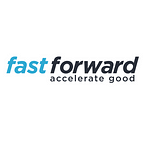SF Homeless Project — How Tech Nonprofits are Building Scalable Solutions
This week over 70 media publications banded together as part of the SF Homeless Project, a foray into solutions-focused coverage aiming to shine light on the issue and spur change in the right direction. Homelessness has been an unwavering problem in San Francisco for the past twenty years. In 2015, the city counted 6,686 homeless in San Francisco. But in reality the number may be much higher. Tent cities and streets lined with sleeping homeless is a familiar image to all of us at Fast Forward, and we have the utmost admiration for the San Francisco Chronicle’s initiative to bring this issue to the forefront of the national conversation around social problems.
At Fast Forward we are driven to help nonprofit startups leverage technology to eradicate some of the key problems that cause homelessness in the first place. It’s our belief that there are some problems that markets simply cannot solve. Homelessness is one of them, as are poverty, inadequate access to housing and healthcare, and hunger which exacerbate this issue. Tech nonprofits are able to impact under resourced communities in a way that for-profit companies can’t. The nonprofit model meanst success is measured in impact instead of revenue, which is the perfect business solution when your product or service is reaching low-income or homeless communities.
According to the National Law Center on Homelessness & Poverty, the leading causes of homelessness in metropolitan cities are lack of affordable housing, unemployment, poverty, and mental illness. Several of our alumni have built incredible technology solutions to these root issues of homelessness. Here are a few examples:
It’s no secret that San Francisco is the most expensive city in the country. Resources to find affordable housing were scant until One Degree launched its online platform, which is like a Yelp! for social services. Social services resources used to live solely in big, fat binders that sat in places like police stations and could only be accessed in person. One Degree put all of this information online, enabling low-income families to find resources they need like housing, food, and after school programs. The platform has already helped over 100,000 individuals in the Bay Area find the community resources they need. One Degree’s auxiliary platform, One Home, has helped over 10,000 Bay Area residents search for affordable housing.
Every year $5 billion in perfectly good prescription medications are flushed down the drain or burned in incinerators. Meanwhile, 50 million Americans avoid filling their prescriptions due to high cost. SIRUM built a tech solution to fix this, and has connected 100,000 people to affordable prescription drugs to $5.6M worth in medications. This year SIRUM helped launch California’s first drug donation pharmacy, Better Health Pharmacy, in partnership with Santa Clara County. The pharmacy is supplied 100% by medicine donated through SIRUM’s platform and fills prescriptions at low to zero cost to patients. Read the story of how inability to afford prescription mental health medication almost led a Bay Area woman to homelessness.
In the average public school there is one guidance counselor to every 500 kids. That means each student gets a mere 8 minutes with a counselor each year. Can you imagine figuring out what you want to do with your life in just 8 minutes? Career Village.org launched to help students in low-income communities get answers to their most pressing career questions. The platform crowdsources career advice from experienced professionals to advise students on how to navigate their future career paths and achieve goals. So far they’ve helped over 1M students and have over 10,000 professional volunteers on the platform.
If we want to conquer jarring social problems like homelessness, we need to start from the bottom. We simultaneously house the best tech talent in San Francisco, while thousands of our residents are sleeping on the streets. If we can channel this tech talent into building more scalable nonprofit businesses that address issues like education, poverty, and housing, we can equip all communities with the tools they need to thrive.
Interested in learning more about tech nonprofits? Sign up for our newsletter to keep up to date with tech nonprofit news, careers, and events.
